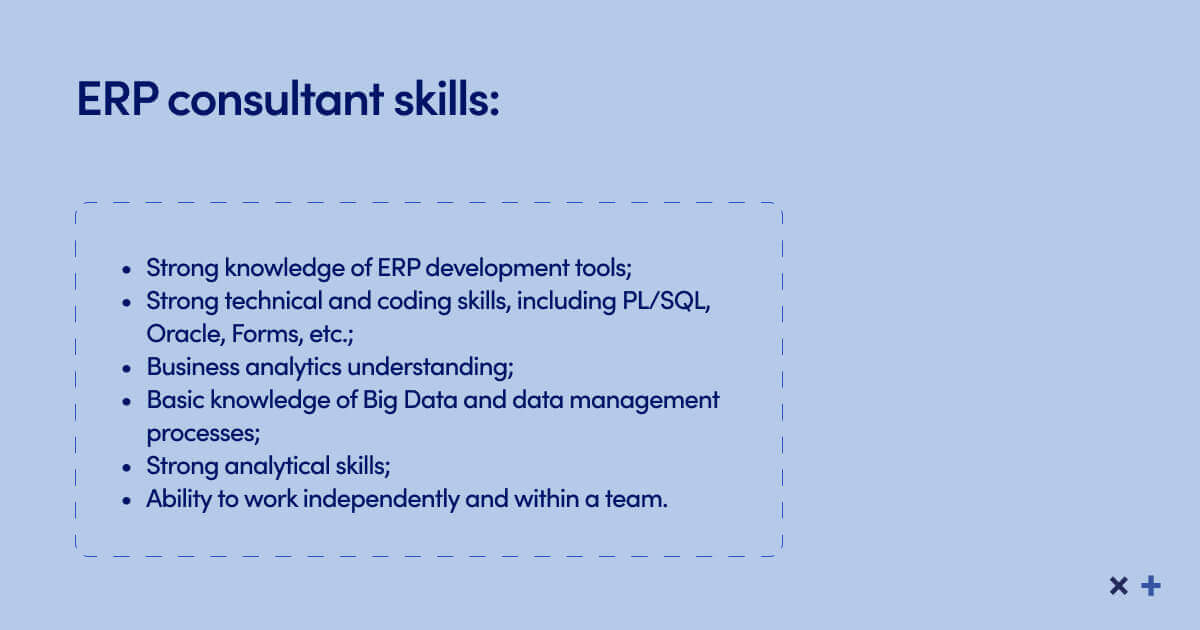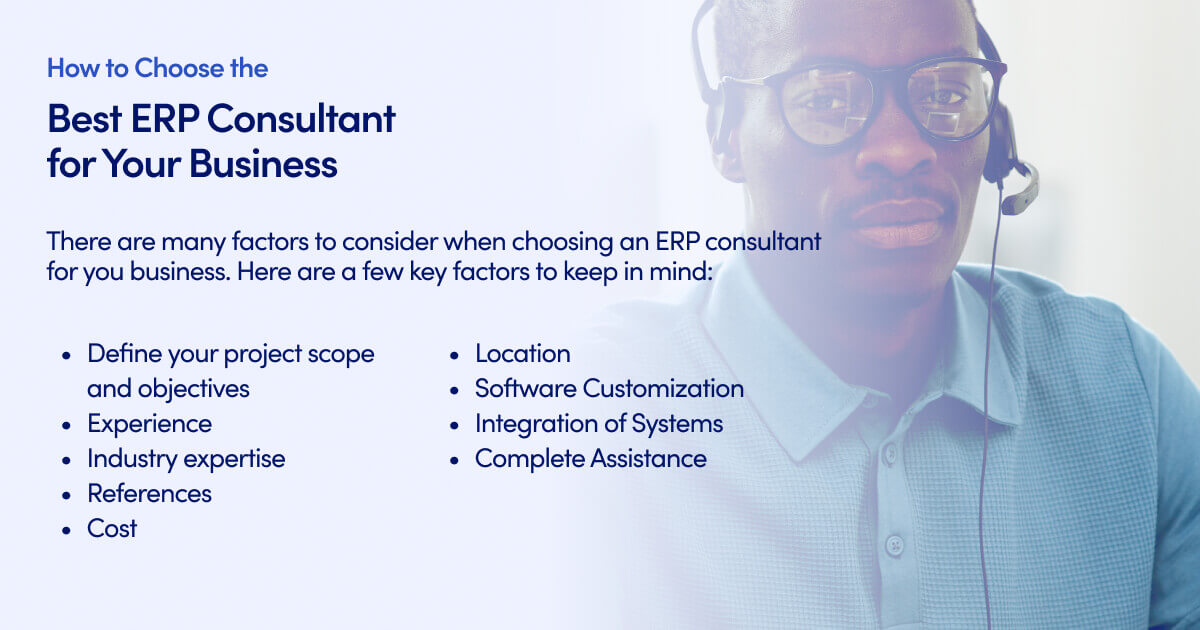Is a sound ERP strategy and sufficient budget enough? According to the most recent data, possibly not. 50% of all first ERP implementations fail. Why is that?
More often than not, it is due to the inadequate skillset of the teams. However, the teams and the business management are not enough for a successful implementation. They also need an expert from the outside who specializes in enterprise resource planning and has a solid knowledge of the product that they are planning on implementing. Such an expert is called an enterprise resource planning (ERP) consultant.

 An ERP consultant is a guide in managing enterprise resource planning (ERP) systems for organizations and big enterprises and helps implement them from scratch. Their main responsibility is to oversee the development and the execution of the business analysis.
Let’s take a look at all the tasks and activities that are managed by ERP consultants (the list is obviously not exhaustive and depends on the specific ERP software that they help implement):
An ERP consultant is a guide in managing enterprise resource planning (ERP) systems for organizations and big enterprises and helps implement them from scratch. Their main responsibility is to oversee the development and the execution of the business analysis.
Let’s take a look at all the tasks and activities that are managed by ERP consultants (the list is obviously not exhaustive and depends on the specific ERP software that they help implement):



Who is an ERP consultant?
The enterprise resource planning (ERP) consultant is the person who is the accelerator and the point of growth for the company during their software implementation. He is the integrator who possesses an in-depth knowledge of different solutions. A consultant for ERP system should fully understand the technical and functional aspects of ERP system. What’s more, they are equipped with knowledge on how to modify and customize each of the solutions to meet the specific needs of the industry or business niche. After all, such a person is responsible for the successful integration of the software within a given company. The primary aim of ERP consultants is to guarantee that the ERP software runs smoothly and performs as efficiently as possible. If anything needs testing, fixing or customizing, they should be able to develop solutions and provide explanations. That is why without ERP consultants, the business digital transformation is almost impossible (and very often doomed to fail). An ERP consultant is a guide in managing enterprise resource planning (ERP) systems for organizations and big enterprises and helps implement them from scratch. Their main responsibility is to oversee the development and the execution of the business analysis.
Let’s take a look at all the tasks and activities that are managed by ERP consultants (the list is obviously not exhaustive and depends on the specific ERP software that they help implement):
An ERP consultant is a guide in managing enterprise resource planning (ERP) systems for organizations and big enterprises and helps implement them from scratch. Their main responsibility is to oversee the development and the execution of the business analysis.
Let’s take a look at all the tasks and activities that are managed by ERP consultants (the list is obviously not exhaustive and depends on the specific ERP software that they help implement):
- Identify weaknesses and strengths on an ERP product
- Suggest ways of improving the ERP system (customization, testing, data management, etc.).
- Implementing and supporting the ERP software
- Document the status of ERP configuration
- Assisting technical teams with change management
- Providing technical expertise
- Writing design specifications and estimates for programs
- Participating in decision-making for optimization of technology management

What skillset should an ERP consultant possess?
If you want your ERP implementation project to succeed the first time, make sure that you spend enough time to know your ERP consultant in-and-out. You need to make sure that they have the necessary skills to tackle all the intricacies of the project. What skills should you look for in your ERP consultant?- Technical and coding skills (PL/SQL, Oracle Forms, ABAP, etc.)
- Hand-on ERP development tools: SAP S/4HANA, Oracle ERP, Intuit, Dynamics, etc.
- Strong analytical skills
- Leadership quality (effective team management)
- Organizational skills
- Interpersonal communication skills
- Financial or accounting knowledge (a big plus)
- Business process analysis
How to choose an ERP consultant?
Choosing an ERP consultant is an important, however sometime a neglected step towards a successful ERP implementation. As ERP consultant is responsible for implementing different types of solutions, their role is very important. They act as an expert in the specific field and it is their main duty to provide appropriate solutions to businesses. The overall goal is for the company to do the best use or their enterprise resource planning solution data. So, what criteria should you be looking at when choosing your ERP consultant? Let’s look at the soft skills now:- Responsiveness: communication is a critical factor that contributes to the success of an ERP project. Choose your ERP consultant, having in mind the productivity and the growth of your company. They should be available, open for discussion and debates and flexible.
- Listening ability: this means no more or less than simply the thorough understanding of the project. The ideal ERP consultant is the one who understand your needs and requests, correctly projects your budgets, has the ability to listen to you and, at the same time, does not impose their vision or opinion at all costs. You need to create a lasting and honest relationship with your ERP consultant so you need to know that you are heard.
- Proactivity: this is fundamental. The ERP project might be subject to different changes, constraint and unforeseen circumstances. You need an available and proactive ERP consultant so that they can always be one step ahead, establish priorities and leverage the risks. Then, you can use it against your competitors on the market.
- Expertise: this one goes without saying. Experience and extensive knowledge regarding ERP software system is vital. However, make sure that the ERP consultant that you choose also has skills to transfer that knowledge. They should be capable of an educational approach so that the teams would be able to learn about the ways of tackling and managing the ERP solution.
- Proximity: an often overlooked factor is whether the consultant is in the same geographical region. Due to intensified communication and the need to meet and discuss the project continuously (and the duration of the ERP project, too), it is much more advantageous to have the ERP consultant nearby. One that is located hundreds of kilometers away might negatively impact some of the project bottlenecks or deadlines.











